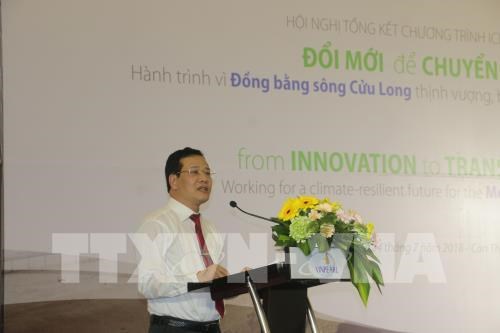Programme helps raise Mekong Delta’s resilience to climate change effects
The Integrated Coastal Management Programme (ICMP) in the Mekong Delta region has brought about marked economic benefits to targeted localities, heard a conference in Can Tho city on July 24.
 At the conference (Source: VNA)
At the conference (Source: VNA)Can Tho (VNA) – The Integrated Coastal Management Programme (ICMP) in the Mekong Delta region has brought about marked economic benefits to targeted localities, heard a conference in Can Tho city on July 24.
The programme was launched in 2011 at a cost of 23 million EUR (26.9 million USD) funded by the German and Australian governments via the German Development Cooperation Organisation.
Running five projects, the programme has come to the Mekong Delta provinces of Soc Trang, Bac Lieu, Ca Mau, Kien Giang, and An Giang, with the aim of coastal protection using the ecosystem; supporting local farmers in agriculture and aquaculture; and promoting cooperation among provincial governments.
Its overall objective is to make the Mekong Delta region more resilient to the severe effects of climate change.
At the event, participants looked into the projects’ achievements in response to climate change over recent years in the agriculture, fishery, and forestry sectors.
On this occasion, the Vietnamese Ministry of Agriculture and Rural Development launched a programme on climate change adaptation in the Mekong Delta based on human approaches and science and technology for 2019-2021.
The Mekong Delta is Vietnam’s most important agricultural region, contributing around 52 percent to the country’s rice production. It is also a biological hotspot, with many endemic species.
According to official studies, 38 percent of the Mekong Delta region is at risk of being underwater by the year 2100, with some parts of the coast facing erosion at a pace of 30m each year.
Furthermore, the protective mangrove forests are in considerable decline, and the intrusion of saltwater into ground water is becoming a serious problem as it damages the fertile soil for agriculture.
In addition, human activities in the region, such as clearing coastal forests, altering natural waterways, and adopting intensive agriculture and aquaculture practices, are threatening the ability to provide essential ecosystem services in the Mekong Delta. –VNA













